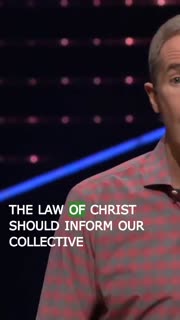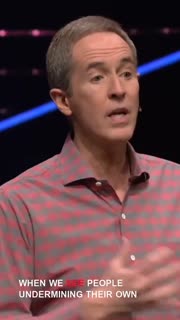Unity in Christ Beyond Political Divisions
Devotional
Sermon Summary
Bible Study Guide
Sermon Clips
### Quotes for Outreach
1. "Jesus did not come to take sides. He came to take over. Jesus came. Jesus came to introduce the kingdom of God to earth. The kingdom of God values, the upside-down kingdom, where those with the wealth and the power of God are able to take over." [03:39] (60 seconds)
2. "The kingdom of God, where the king laid down his life for his subjects rather than demanding his subjects lay down their lives for him. The kingdom of God that was so broad and inclusive that he said, and everybody is invited to participate in it." [04:58] (16 seconds)
3. "You are to love one another, with a caveat, as I have loved you. This isn't just a love fest. You are to love one another. This isn't one way. This is two way. You're to love one another as I have loved you. And then he said this, by this, unique brand of love, by this unique brand of new covenant love, everyone will know you're my disciple if you love one another." [06:18] (23 seconds)
4. "When the concerns of others concern you and you act on it, you are fulfilling the law of Christ. You are doing what Jesus told the disciples to do. And again, the New Testament marching orders for those of us who were Jesus followers." [10:03] (12 seconds)
5. "The law of Christ should inform our collective conscience. Let me give you a couple of quick examples because as simple as that is, this is a powerful, powerful, powerful dynamic. In fact, this dynamic shaped Western culture." [18:45] (13 seconds)
### Quotes for Members
1. "The kingdom of God will always, in some detail and at some level, conflict with the kingdoms of men. And the kingdom of God will always, at some level and some detail, conflict with your political party and the platform of your political party and our political candidates. There's always going to be a tension." [04:58] (16 seconds)
2. "As Jesus followers, all of, of all persuasions, regardless of your political persuasion, if you're a Jesus followers, the law of Christ, that is your marching orders. and the law of Christ should inform over time as we grow as Christians, our conscience, that our conscience should become hardwired into the law of Christ." [10:03] (21 seconds)
3. "When we see people undermining their own future, undermining their health, undermining their relationship with their kids, undermining the integrity of their family or the integrity of society, we should be moved by that. We should be moved to action. It should bother us." [10:56] (13 seconds)
4. "When the law of Christ informs an individual or a village or a city or a nation's conscience, things change. And there has been so much change, even in our nation, because of this very same dynamic. Because it's so brilliant. Jesus' single new covenant command was so powerful." [18:45] (20 seconds)
5. "We should never resist science. We should never resist discovery. We should be the most curious people, because our faith is tethered not to an interpretation of a text. Our faith is tethered to an event in history, the resurrection of Jesus. So we don't need to fear new, and we don't need to fear science." [22:25] (19 seconds)
Ask a question about this sermon
1. "Jesus did not come to take sides. He came to take over. Jesus came. Jesus came to introduce the kingdom of God to earth. The kingdom of God values, the upside-down kingdom, where those with the wealth and the power of God are able to take over." [03:39] (60 seconds)
2. "The kingdom of God, where the king laid down his life for his subjects rather than demanding his subjects lay down their lives for him. The kingdom of God that was so broad and inclusive that he said, and everybody is invited to participate in it." [04:58] (16 seconds)
3. "You are to love one another, with a caveat, as I have loved you. This isn't just a love fest. You are to love one another. This isn't one way. This is two way. You're to love one another as I have loved you. And then he said this, by this, unique brand of love, by this unique brand of new covenant love, everyone will know you're my disciple if you love one another." [06:18] (23 seconds)
4. "When the concerns of others concern you and you act on it, you are fulfilling the law of Christ. You are doing what Jesus told the disciples to do. And again, the New Testament marching orders for those of us who were Jesus followers." [10:03] (12 seconds)
5. "The law of Christ should inform our collective conscience. Let me give you a couple of quick examples because as simple as that is, this is a powerful, powerful, powerful dynamic. In fact, this dynamic shaped Western culture." [18:45] (13 seconds)
### Quotes for Members
1. "The kingdom of God will always, in some detail and at some level, conflict with the kingdoms of men. And the kingdom of God will always, at some level and some detail, conflict with your political party and the platform of your political party and our political candidates. There's always going to be a tension." [04:58] (16 seconds)
2. "As Jesus followers, all of, of all persuasions, regardless of your political persuasion, if you're a Jesus followers, the law of Christ, that is your marching orders. and the law of Christ should inform over time as we grow as Christians, our conscience, that our conscience should become hardwired into the law of Christ." [10:03] (21 seconds)
3. "When we see people undermining their own future, undermining their health, undermining their relationship with their kids, undermining the integrity of their family or the integrity of society, we should be moved by that. We should be moved to action. It should bother us." [10:56] (13 seconds)
4. "When the law of Christ informs an individual or a village or a city or a nation's conscience, things change. And there has been so much change, even in our nation, because of this very same dynamic. Because it's so brilliant. Jesus' single new covenant command was so powerful." [18:45] (20 seconds)
5. "We should never resist science. We should never resist discovery. We should be the most curious people, because our faith is tethered not to an interpretation of a text. Our faith is tethered to an event in history, the resurrection of Jesus. So we don't need to fear new, and we don't need to fear science." [22:25] (19 seconds)










